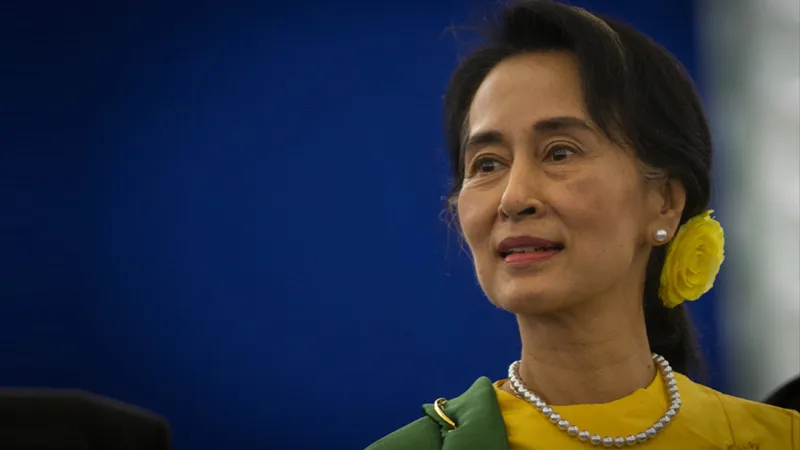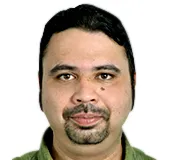Wide speculations have embroiled the nominations for the presidential candidate in Myanmar. The National League for Democracy (NLD) leader, Aung San Suu Kyi, who indisputably holds the key to the nomination of president, is keeping her cards close to her chest.
One common speculation that has emerged from political circles in the country is that the NLD is considering the option of circumventing the constitutional provision that bars Suu Kyi from becoming the president. This speculation is a significant departure from Suu Kyi’s much publicised statement following her party’s landslide victory, that, in the NLD-led government in Myanmar, she would be “above the president.”
She had called the government that she intends to form as the “national reconciliation” government, suggesting attempt at rapprochement with the military. As to who will become the president, will depend on the outcome of the behind-the-scenes negotiations between the NLD and the military until March 17, which is the last day for nominating the president and vice-presidents in the parliament.
Suspending Article 59(f)
Article 59(f) of the constitution bars anyone whose spouse or children are foreign nationals from becoming the president or vice-president. The constitutional provision made by military rulers of the country in the 2008 constitution has remained the bone of contention, ever since the NLD’s participation in parliamentary politics, when they cornered 43 of the 44 seats they contested in the by-elections.
Now, the NLD is mulling over the option of moving a motion in favour of suspending the Article 59(f) of the constitution that would allow their leader to become the president. Unlike the previous constitution, the 2008 constitution does not mention whether an article of the constitution can be suspended or not. Any motion concerning constitutional provision can be passed in the parliament only by a two-thirds majority, and hence taking the military into confidence would be crucial.
The media has reported that hard bargaining is on between the NLD and the military for suspension of the constitutional provision 59(f). Media is also abuzz with reports of an instruction to NLD MPs by the party high-command to brace for a session of the parliament that is said to have the constitutional hurdle crossed.
Suu Kyi and the NLD are said to have kept their options open. With the nominations of speakers and deputy in upper and lower houses of the parliament complete, bearing a mix of NLD and non-NLD MPs, including a former military general, Suu Kyi has shown much purpose to the term “national reconciliation,” that she calls the government her party is going to form.
Among the speakers also included an ethnic Karen, a Kachin, and an Arakanese. The move of nominating ex lower-house speaker and former Union Solidarity Development Party (USDP) chair Thura U Shwe Mann, a close ally of Suu Kyi to a legal affairs commission shows that she would leave no stone unturned in getting the constitutional provision suspended. Thura U Shwe Mann was in favour of repealing Article 59(f).
Successful rapprochement between the military and the government-elect is required for any constitutional provision to be suspended the military and USDP seems to be not interested in giving the concession to the NLD for suspending the 59(f). Even the military seems uninterested. Commander-in-chief of the defence forces, Min Aung Hlaing, who has got himself another five-year term has remained tight-lipped over the nominations for the executive post.
In the couple of meetings with the NLD chief to discuss power transition in the country, Hlaing is not reported to have discussed nominations for the executive post. The NLD is considering appointing military MPs to key government posts and as chief ministers of states, and expect, in return, that the military bloc will favour suspension of 59(f).
However, this move could be counter-productive, as reports hint at the military being miffed by NLD’s nomination of members of the military bloc for constitutional posts, requiring them to resign from their military assignments to take up constitutional posts.
The only factor that could possibly make military commander Min Aung Hlaing to give in to the compromise is in return seek Suu Kyi’s assurance that her government will not infringe upon the military’s vast economic interests, nor seek revenge for abuses under years of junta rule.
The suspension of the article 59(f) has not found empathy from the presidential office either, whose spokesperson Ye Htut had gone on record stating that suspension of any constitutional provision is possible only during emergency. The USDP is also not likely to favour the suspension, after Shwe Mann appointment to the key position has led to an apparent split in the military-backed party.
In the nation’s interest
Continuing to use the corridors of power as the sanctum sanctorum of reforms introduced by the erstwhile military-led government would remain the single most important challenge for the newly-elected NLD government in the country.
Widening the web of democratic reforms and reconciliation with ethnic minorities should be the priorities of the government elect. Suu Kyi’s elevation to the corridors of power in Myanmar have hardly helped stop the heavy fighting between the Shan rebels and the army in the northern Shan state.
The political dialogue set to start soon with eight ethnic groups who have signed the ceasefire, the government elect has a task at hand when it comes to ethnic reconciliation. So, Suu Kyi and her party have to cautiously tread with government formation so as to not tarnish its image nationally and internationally.
She cannot set a bad precedent by subverting constitutional provisions for fulfilling her ambitions. Whether Suu Kyi becomes the president or not, it is clear that she will single-handedly lead the government, as she had indicated after her party’s victory in the November polls that she would be “above the president.”
So, how does it matter who becomes president? Maybe it does matter for Suu Kyi personally, after devoting 25 years for political change in Myanmar. But, where she has emerged as the most powerful civilian of the country, national interest must precede any personal ambition. But, as many commentators have noted, Suu Kyi the activist and democracy crusader is radically different from Suu Kyi the statesman, who harbours the personal ambition of leading the country.
Suu Kyi is only one among the many heroes who cut their teeth in the 1988 uprising against the tyranny of General Ne Win’s one-party rule. She was then known to be a moderate leader among the many shades of political leaders opposing the State Law and Order Restoration Council (SLORC). Like Suu Kyi, a hundred thousand activists have sacrificed their lives to fight for bringing democracy to the country before and since 1988.
Aung San Suu Kyi must seize this opportunity of steering the country into a path of holistic welfare of its people and democracy. Whether she becomes the president or not is of little consequence, but her stewardship could determine a lot about the course of the country’s future.
This commentary originally appeared in Dhaka Tribune.
The views expressed above belong to the author(s). ORF research and analyses now available on Telegram! Click here to access our curated content — blogs, longforms and interviews.




 PREV
PREV


